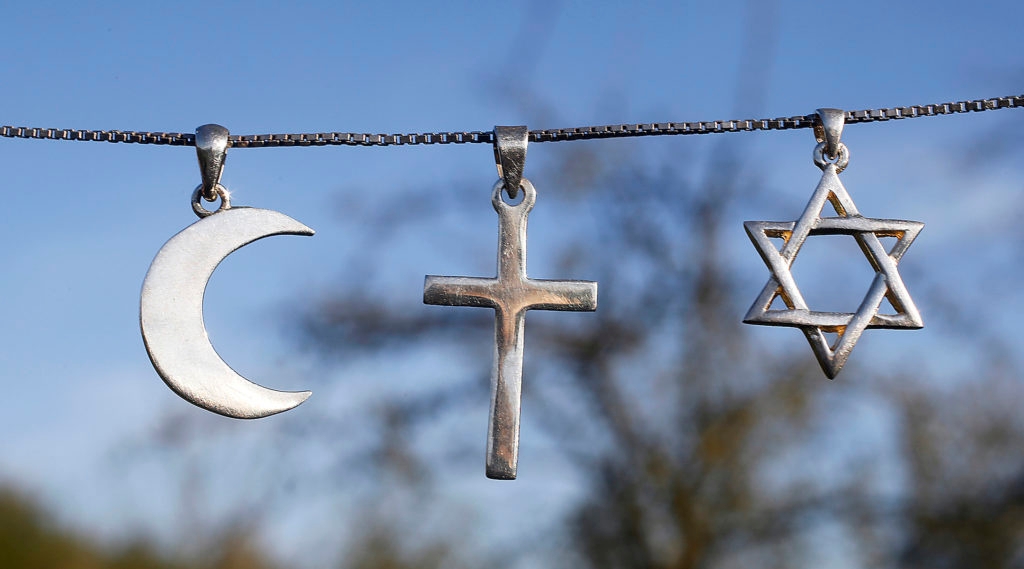Americans don’t know much about Judaism but love the Jews, survey says
Published July 23, 2019

(JTA) — U.S. Jews know more about religion in general than their non-Jewish neighbors, a new survey shows.
Americans who are not Jewish, meanwhile, don’t know a lot about Judaism. But they like Jews more than any other religious group. And they think there are more Jews in the country than there actually are. The more non-Jews know about Jews, the more they like them.
ADVERTISEMENT
The data comes out of a new survey on what Americans know about religion published Tuesday by the Pew Research Center. The survey asked a group of diverse Americans a set of 32 questions about religion, ranging from knowledge of the Bible and Christianity to knowledge of Judaism and other religions.
Ten of the questions related to Judaism in some way: four asked directly about Jewish history, practice and texts; five were about the Hebrew Bible; and one was about the size of America’s Jewish population.
The survey was conducted Feb. 4-19 and included a total of nearly 11,000 respondents. The margin of error for the whole group was 1.5 percent. The margin of error for the Jewish sample was 8.6 percent.
Here are three takeaways from the survey.
Americans don’t know a lot about Judaism.
Out of four questions on Judaism, non-Jewish Americans got a dismal score: They averaged less than one out of four correct. Besides Jews themselves, atheists did the best on the Jewish questions, averaging 1.3 correct answers.
None of the questions on Judaism received a majority of correct answers:
- 29 percent of respondents knew that the Jewish Sabbath (Shabbat) begins on Friday night.
- 27 percent knew Kabbalah (Jewish mysticism) was associated with Judaism.
- 24 percent knew that Rosh Hashanah is the Jewish New Year.
- 13 percent knew Maimonides was a Jewish scholar.
Older Americans did better on all of these questions than the youth. Forty percent of those 65 and older, for example, knew that the Jewish Sabbath begins on Friday night, compared to 18 percent of respondents aged 18 to 29.
ADVERTISEMENT
Jews did much better on these questions than non-Jews, averaging 3.1 correct out of four. Nearly 90 percent knew that Shabbat begins on Friday night, almost 80 percent knew Kabbalah is Jewish, 82 percent knew Rosh Hashanah is the Jewish New Year and 58 percent knew that Maimonides was Jewish.
Americans as a whole also didn’t know how many Jews live in the country. Fewer than one in five knew that Jews are less than 5 percent of Americans. A quarter thought Jews were more than 5 percent of Americans, and the rest of the respondents didn’t know.
But Jews know a lot about religion.
Jews didn’t only outscore their non-Jewish counterparts when it came to Jewish knowledge. They outscored everyone when it came to general religious knowledge, too.
Besides the questions on Jewish practice, history and text, seven questions were about Christianity, nine were about the Bible, including the New Testament, nine were about “world religions,” two were about atheism and agnosticism, and two were about religion in the United States.
Jews were the only religiously affiliated group to get a majority of the questions right. On average, Jews got 18.7 questions right out of 32, as opposed to a national average of 14.2. Atheists and agnostics also got a majority of questions right, but the closest religiously affiliated group was evangelical Christians, who got an average of 15.5 correct.
Jews scored highest, the survey said, “even after controlling for levels of education and other key demographic characteristics such as race, age and gender.”
Jews also scored high on world religions and on knowledge of atheism and agnosticism. Ninety percent, for example, knew that atheists don’t believe in God. More than 85 percent knew that Ramadan is an Islamic holy month and that Mecca is an Islamic holy city.
They were above average when it came to knowledge of the Bible (including the New Testament) and knowledge of Christianity. On the question of who saved the Jews from murder by appealing to the king (an occasion marked by the Jewish holiday of Purim), 66 percent of Jews correctly responded “Esther,” as opposed to 28 percent of Americans as a whole.
The more Americans know Jews, the more they like them.
As other surveys have shown, Americans tend to have warm feelings toward Jews. Asked to rate religious groups on a thermometer scale, from 1 to 100, Jews got an average rating of 63, the highest of any group. Forty-one percent rated Jews at 67 or higher, while 8 percent rated Jews 33 or lower.
Atheists and Muslims scored lowest, both with an average thermometer score of 49.
The more Americans knew about religion in general, and Judaism in particular, the more they liked Jews. Those who answered 25 or more questions correctly, for example, gave Jews an average rating of 70.
And those who know Jews personally also rated them higher. The respondents who know Jews gave Jews an average rating of 66, versus 56 from those who do not know any Jews.














